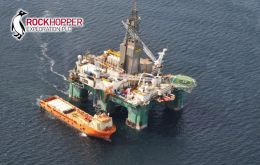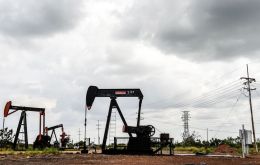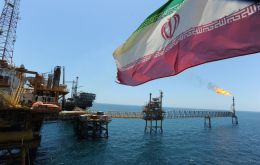MercoPress. South Atlantic News Agency
Tag: oil market
-
Wednesday, April 22nd 2020 - 08:03 UTC
Wall Street markets tumble for a second straight session on Tuesday

Wall Street stocks tumbled for a second straight session on Tuesday as worries about the chaos in the oil market overshadowed progress in Washington on additional relief for small businesses.
-
Monday, April 13th 2020 - 10:54 UTC
Oil prices recover modestly following a historic deal by world's largest producers

Oil prices jumped on Monday after swinging wildly in early trading as investors weighed whether a historic deal by the world’s biggest producers to cut output would be enough to steady a market pummeled by the coronavirus.
-
Thursday, April 9th 2020 - 08:45 UTC
Falklands' Sea Lion development delayed responding to oil market conditions

Rockhopper Exploration is responding to market developments by reducing staffing levels and activity related to the Sea Lion development in the offshore North Falkland basin. The company plans to maintain a smaller team, mainly focused on regulatory, fiscal and financial issues, pending a recovery in the external macro-environment.
-
Tuesday, March 10th 2020 - 08:15 UTC
Black Monday cocktail: oil price war and coronavirus trigger market panic

World oil prices crashed on Monday, fuelling a vicious selloff on stock markets that were already buckling from the spreading coronavirus outbreak. Stocks tanked as the global oil market nosedived 30% at one stage after top exporter Saudi Arabia slashed the prices it charges customers following a bust-up with Russia over crude production cuts.
-
Monday, September 9th 2019 - 09:45 UTC
OPEC+ wants to further cut output to support oil price, but admits it no longer controls the market

Top oil producers will consider fresh output cuts at a meeting this week, but analysts are doubtful they will succeed in bolstering crude prices dented by the US-China trade war.
-
Saturday, March 16th 2019 - 09:21 UTC
Venezuelan continued oil fallout presents a challenge for global markets, says IEA

A major advisor to energy producing nations has suggested that the continued fallout from Venezuela could present a “challenge” for global oil markets. The International Energy Agency (IEA) has warned that crude supplies from Venezuela are at risk of falling sharply in the midst of an electricity crisis which has paralyzed the country recently.
-
Thursday, February 7th 2019 - 07:44 UTC
Bank Of America: Oil Demand Growth To Hit Zero Within A Decade

By 2030, oil demand could hit a peak and then enter decline, according to a new report. For the next decade or so, oil demand should continue to grow, although at a slower and slower rate. According to Bank of America Merrill Lynch, the annual increase in global oil consumption slows dramatically in the years ahead. By 2024, demand growth halves, falling to just 0.6 million barrels per day (mb/d), down from 1.2 mb/d this year.
-
Thursday, December 6th 2018 - 08:28 UTC
Mexican president pressing foreign oil companies to show results

Mexico’s newly inaugurated president Andres Manuel Lopez Obrador, AMLO, is turning up the heat on foreign oil companies to show results before he holds new auctions.
-
Tuesday, November 6th 2018 - 08:44 UTC
Oil market cautious as US punitive sanctions on Iran become effective

Oil prices were mixed on Monday after a steep five-day fall, as the United States formally imposed punitive sanctions on Iran but granted eight countries temporary waivers allowing them to keep buying oil from the Islamic Republic. The sanctions are part of U.S. President Donald Trump’s effort to curb Iran’s missile and nuclear programs and diminish its influence in the Middle East.
-
Tuesday, September 25th 2018 - 07:45 UTC
Oil market turbulence ahead of US sanctions on Iran; OPEC meeting does not plan to increase output

Brent crude breached US$ 81 a barrel on Monday — its highest level in nearly four years — on the back of a tightening oil market and OPEC leaders signaling they won't be immediately boosting output. Global benchmark Brent crude rose as high as US$ 81.39 a barrel, its strongest level since Nov. 21, 2014.
